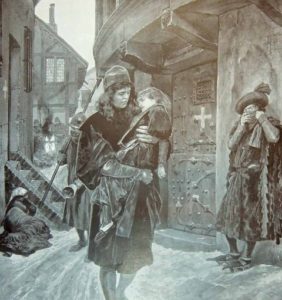 It was lonely in the streets of Goldberg, Silesia. The month was December in the year of our Lord 1353, and it was lonely that Christmas Eve. In the early 1330’s an outbreak of bubonic plague occurred in China and by October of 1347 it had spread to Europe.
It was lonely in the streets of Goldberg, Silesia. The month was December in the year of our Lord 1353, and it was lonely that Christmas Eve. In the early 1330’s an outbreak of bubonic plague occurred in China and by October of 1347 it had spread to Europe.
The disease struck and killed people with terrible speed. An Italian writer sadly observed, people who contracted the plague “ate lunch with their friends and dinner with their ancestors in paradise.” Each spring the plague spread further and medieval medicine was helpless to stop it. After five years, 25 million people, 1/3 of Europe’s population, were dead. In 1353, the plague eventually made it to Goldberg. Having heard how entire cities and hamlets had been depopulated, filled only with rotting and unburied corpses, the people of Goldberg quickly locked themselves away in their homes, Without newspapers, radio, television, no one knew what was happening to family and friends; no one knew how long the plague would last. Goldberg, Silesia, was a lonely place to be on Christmas Eve in the year of our Lord 1353.
Finally, after weeks of lonely isolation one man, and only one man, ventured out of his house at midnight on Christmas Eve. He knew that he was the only person in the village who had survived. As he walked through the streets, every shop he passed held recollections of people with whom he had done business; every house was packed with memories of someone he had known, whom he had loved. The man knew it was Christmas Eve, and even though he might be alone, even though he knew his moment of death might be imminent, he raised his voice to sing. He sang an old Christmas hymn. You might know it, it begins this way; “A great and mighty wonder. A full and holy cure: The Virgin bears the infant With virgin honor pure! Repeat the hymn again: To God on high be glory And peace on earth to men!” He was, in his loneliness, comforted by the Savior’s song. He repeated the verse.
In the stillness of the night his voice echoed off the bolted doors and shuttered windows. And then, from behind a barred door, another voice joined with him in the singing. Soon that person stood beside him in the street. Together they sang in the late Christmas Eve hour. “Since all He comes to ransom, By all be He adored, The Infant born in Bethl’em, The Savior and the Lord. Repeat the hymn again: To God on high be glory And peace on earth to men!” Their songs brought strange replies, and from living tombs people emerged. All that was left of the town were 25 survivors; still with new courage they marched through the death-stricken streets singing of the love of God which had become incarnate in Jesus, the Babe of Bethlehem, the Christ of the cross, the Savior of the open tomb. Surrounded by death, because of the Christ, they could confidently sing: “To God on high be glory, and peace on earth to men.”
“A Great and Mighty Wonder” LSB 383
Source: Lutheran Hour Sermon by Rev. Dr. Ken Klaus, Christmas 2007

Goldberg was the town where my great grandfather was born in 1830 his father went missing in the 1830’s. My great grandfather left Goldberg in 1848 to come to the Barossa Valley in South Australia with his mother and step father. We still identify as Lutherans’